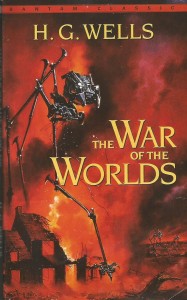 Every time I re-read this book I am amazed all over again. At the contemporary feel of the Martians and their evil stuff, the detailed observations that Wells makes, things like laser rays frying everybody, the intense scenes of the evacuation of London and so on. Also at the rational and deeply observant tone of the narrative. He’s not mean; his characters aren’t haughty or cynical. That in itself is refreshing but the amazing part is the technical imagination and the fact of the great unscrewing of the cylinder while people sit and watch in carriages. Everybody is on horseback or in horse-drawn carriages, there are no telephones, no television, and only the people n the area where the Martians first start devastating everything know it’s happening! Because word doesn’t spread, because there’s no TV, no phones, and well, the newspapers didn’t get the reports because they were written by hand and delivered by post or railway. This was written in, I think, 1897. No bug-eyed monsters here, no ET, just sloppy leathery things that use immensely tall stalking thin things like radio towers, what today we would compare to radio towers. It is all completely believeable, nothing improbable in the least. So, I am in admiration. It is really an outstanding and unusual piece of writing. ‘Far ahead of his time’ ain’t in it. that’s why I love re-reading it. The details surprise me every time. So I am writing a dystopia where there is almost no technology for the common people, they’re back to kerosene lanterns, things move by rail, and only the elite have remnants of our technology, the old technology. I was thinking that the comparison of people with kerosene lanterns as opposed to the upper crust with advanced computers would be confusing but maybe not. Be confused. What the hell.
Every time I re-read this book I am amazed all over again. At the contemporary feel of the Martians and their evil stuff, the detailed observations that Wells makes, things like laser rays frying everybody, the intense scenes of the evacuation of London and so on. Also at the rational and deeply observant tone of the narrative. He’s not mean; his characters aren’t haughty or cynical. That in itself is refreshing but the amazing part is the technical imagination and the fact of the great unscrewing of the cylinder while people sit and watch in carriages. Everybody is on horseback or in horse-drawn carriages, there are no telephones, no television, and only the people n the area where the Martians first start devastating everything know it’s happening! Because word doesn’t spread, because there’s no TV, no phones, and well, the newspapers didn’t get the reports because they were written by hand and delivered by post or railway. This was written in, I think, 1897. No bug-eyed monsters here, no ET, just sloppy leathery things that use immensely tall stalking thin things like radio towers, what today we would compare to radio towers. It is all completely believeable, nothing improbable in the least. So, I am in admiration. It is really an outstanding and unusual piece of writing. ‘Far ahead of his time’ ain’t in it. that’s why I love re-reading it. The details surprise me every time. So I am writing a dystopia where there is almost no technology for the common people, they’re back to kerosene lanterns, things move by rail, and only the elite have remnants of our technology, the old technology. I was thinking that the comparison of people with kerosene lanterns as opposed to the upper crust with advanced computers would be confusing but maybe not. Be confused. What the hell.
Monthly Archives: October 2014
Great expectations and the MacArthur Genius Grants
so every post has to have a picture and that is me and Rita going down the kid’s slide.
Re-reading Great Expectations with a feeling of disappointment in the limp-celery I-forgot-it-in-the-back-of-the-refrigerator main character Pip. He never does anything when all sorts of doable options lie about him. He never makes anything happen. Everything he tries elegantly fails.
What makes all of Dickens’ books for me are the secondary characters and GE has a good plenty of them but Pip drags the narrative behind him carelessly and limply like a trailing raincoat. I never noticed it before. The book is an object lesson in the awfulness of class snobbery which is awful of course but Pip seems to have an infinite capacity to endure boring people. Dickens wants us to see how flattened these people are. Okay, okay. He should have made Trabb’s boy the central character and we could have understood the Awfulness Of Class Snobbery by giving one chapter to Pip. Miss Havisham is BORING, Estella has no redeeming qualities and is equally as boring, and I wished somebody would shoot Pumblechook or send him to the Hulks.
What saves it is the atmosphere of the marshes, that of London, the details of things, the shipping in the Thames, their journey down the Thames . An alive world.
Read an article by Thomas Frank in Salon on the MacArthur Genius grants that had me laughing out loud. He points out the winners as ‘prize magnets’ and listed the buzzwords of admiration and approbation with which the awarders describe the work of the awardees; ‘contemporary’ — ‘experimental’ — ‘original’ — ‘innovative’ — ‘insight’ — alternative’ — ‘vibrant’ — ‘rooted’. The awardees ‘redefine’ and ‘reinvent’.

